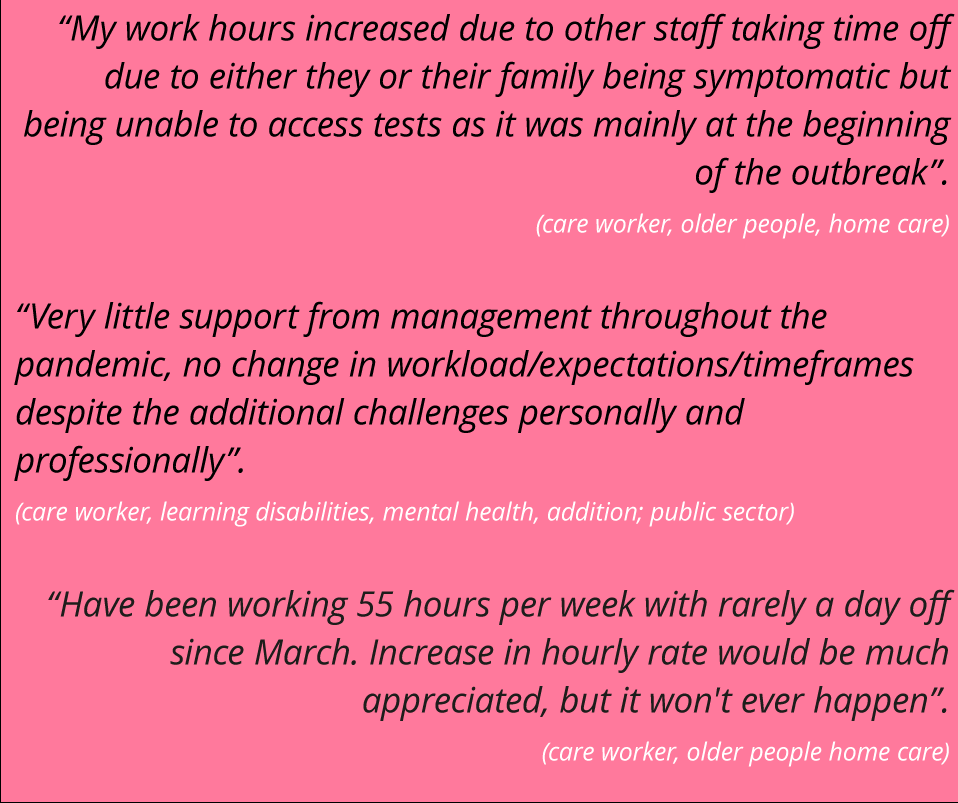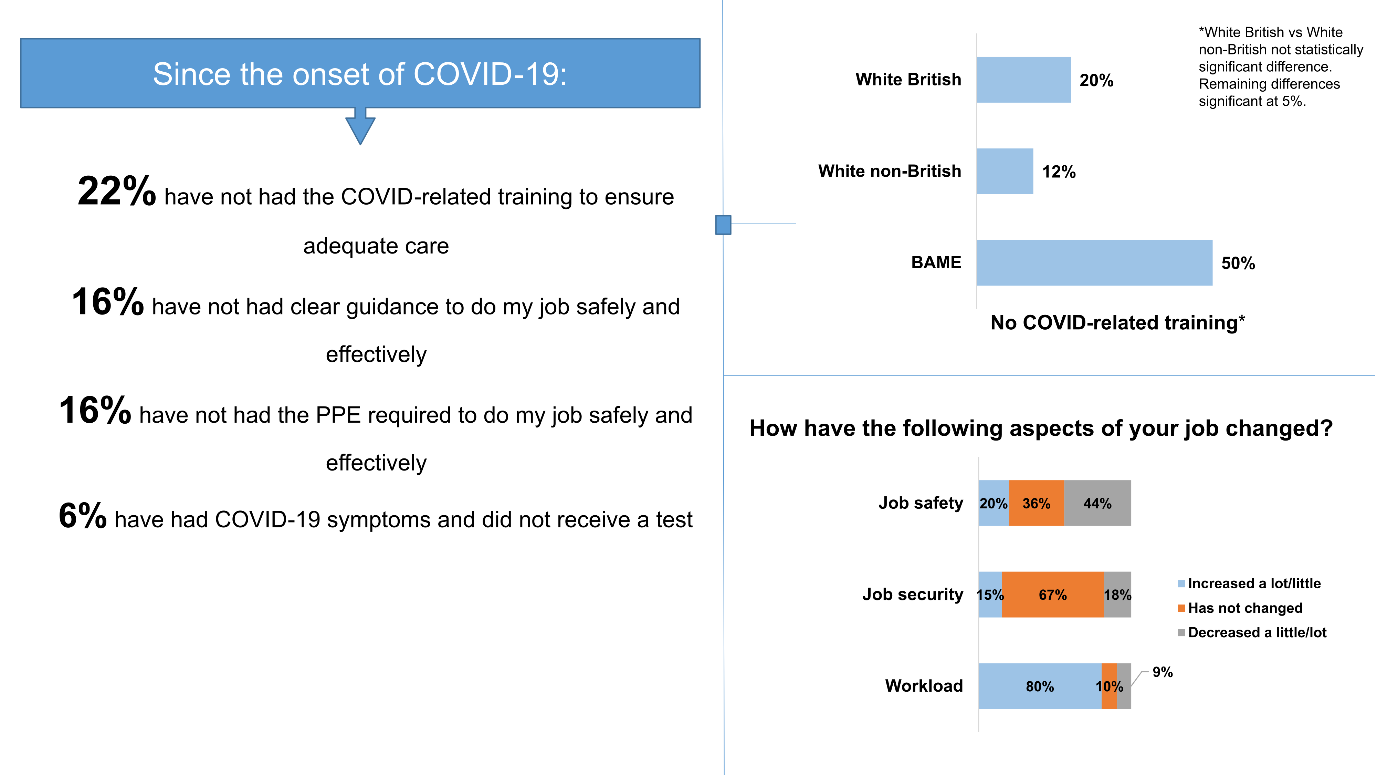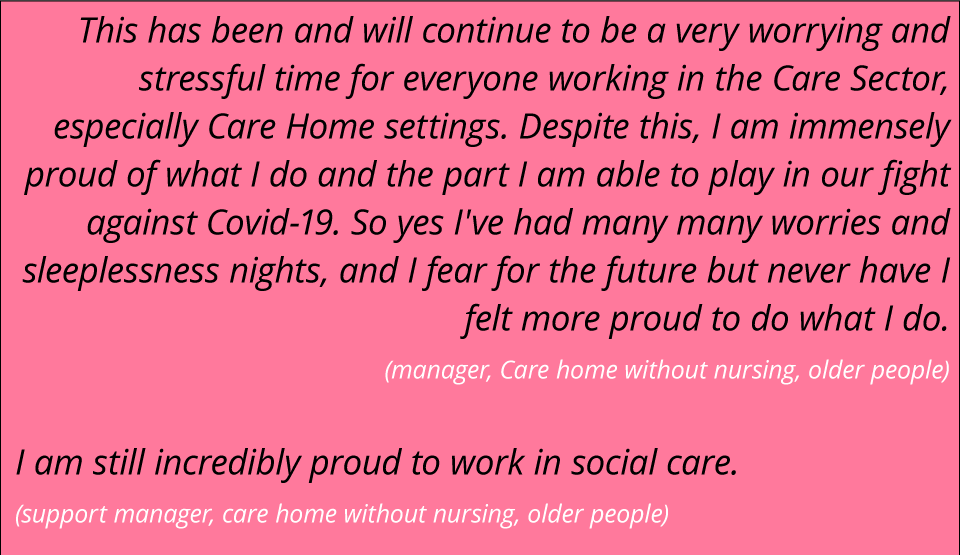November 3, 2020
The Impact of COVID-19 on social care workers’ workload, wellbeing and ability to provide care safely: Findings from the UK
Professor of Care and Health Policy Evaluation and Associate Director of the Personal Social Services Research Unit
The University of Kent
Our new online survey of 296 care workers in Britain – funded by the Health Foundation – reveals the difficulties which social care workers have experienced since the onset of the COVID-19 pandemic in early 2020.
The survey uncovers the incredible workload and difficult working conditions experienced by frontline care workers since the onset of the pandemic. Four-fifths (80%) had increased their workload, while over half increased their working hours. This difference is likely to be attributed to staff covering for other workers who had to self-isolate or to train new volunteers who joined the health and care sectors through the volunteering drive initiated by the government in March 2020.
Eighteen per cent had to self-isolate – a figure rising to 35 per cent among carers from Black, Asian, and minority ethnic group. However, only 20 of our survey respondents indicated they belong to BAME groups. While these results should be read with caution- due to the small number of respondents – they are still alarming given the analysis by the Office of National Statistics showing that care workers had twice the death rate from COVID19 when compared to other health professionals.
Nearly a fifth of those who needed to self-isolate did not receive any pay. The implications of having to self-isolate with no or limited pay (such as statutory sick pay) were considerable for workers who are typically paid the minimum wage.

Nearly half (44 per cent) felt that their job safety had declined, in part due to the inadequacy of Personal Protective Equipment (PPE) and COVID-19 related training. Over a fifth (22 per cent) of care workers said they had not received adequate COVID-19 training; 16 per cent said they had not been given necessary PPE, and 16 per cent said they had not received clear guidance about procedures. The analysis did not show much difference in the experience of care workers mainly working in home care or care homes.
Figure 1 Perception of receiving adequate COVID-19 related training, guidance, access to PPE and changes in job aspects since the onset of COVID-19; RESSCW Pulse Survey Jul-Aug 2020


These work-related problems came at the expense of social carers’ health. Nearly half of them (47 per cent) indicated their general health had worsened since the onset of COVID-19. Fifty-eight per cent indicated that the amount of time their jobs made them feel depressed, gloomy or miserable has increased since COVID-19. An even larger proportion, 81 per cent, highlighted that the amount of time their jobs made them feel tense, uneasy or worried has grown over the same period.
Despite the toll COVID-19 had taken on their health, social care workers remained committed to the critical caring roles they performed.

This high level of commitment expressed by many respondents may help explain why, despite the pressures and problems, almost two-fifths (38 per cent) felt that the quality of care they provided had got better since the onset of COVID-19.
That said, there are essential policy lessons that need to be learned from this crisis. It is crucial, for both the workforce and service quality, to ensure an adequate level of supply of PPE and testing along with necessary training related to effective use of equipment, infection control and social distancing. The findings related to the adverse experience observed among care workers from ethnic minorities require further investigations of potential reasons for such discrepancies. It also calls for developing support mechanisms that are tailored to different groups of workers.
COVID-19 pandemic has exacerbated the effect of long-standing cracks in the social care sector, and the policy response was fragmenting and judged to have come ‘too late’. The situation requires an urgent response to maintain the ability of the sector and its workforce to meet the escalating demands for social care. Any policy or practice support mechanisms need to acknowledge the significant implications on a workforce already suffering from chronic recruitment and retention challenges. A recent report by Skills for Care indicates the sector requires to fill 112,000 vacancies in any given day. The impact of COVID-19 on the way care work is delivered and organised necessitates a reassessment of potential mechanisms meant to protect care workers, service users and their families. These would require both adequate funding as well as a more connected approach across both the health and social care sectors.
Note:
As part of a Health Foundation funded research project, we have developed and conducted a short, pulse, online survey for care workers. The aim was to understand the care workers’ perception of the immediate implications of COVID-19 on their wellbeing, working conditions, and intentions to stay or leave the employer or sector. This survey is the first step, within a larger sub-study focused on understanding the impact of the pandemic on the sustainability of this workforce.
The survey ran between the 3rd of July and 10th of August 2020 and was distributed via social media and formal and informal groups of care workers across the UK. It was designed to be completed in less than 20 minutes and included pre-coded answers to select from as well as free text questions. We received 296 completed survey responses from frontline care workers in different settings, regions and working with various groups of users. The full analysis of the ‘pulse’ survey will be published in a separate report soon.
 By
By